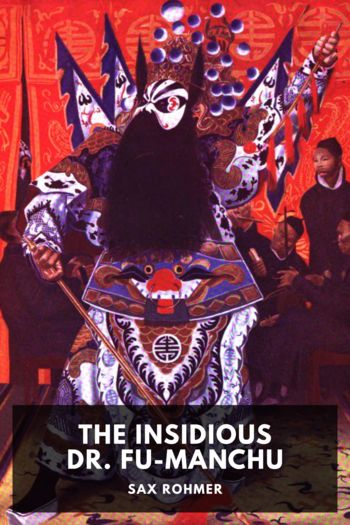The Insidious Dr. Fu-Manchu - Sax Rohmer (best finance books of all time .TXT) 📗

- Author: Sax Rohmer
Book online «The Insidious Dr. Fu-Manchu - Sax Rohmer (best finance books of all time .TXT) 📗». Author Sax Rohmer
By Sax Rohmer.
Table of Contents Titlepage Imprint I II III IV V VI VII VIII IX X XI XII XIII XIV XV XVI XVII XVIII XIX XX XXI XXII XXIII XXIV XXV XXVI XXVII XXVIII XXIX XXX Colophon Uncopyright ImprintThis ebook is the product of many hours of hard work by volunteers for Standard Ebooks, and builds on the hard work of other literature lovers made possible by the public domain.
This particular ebook is based on a transcription produced for Project Gutenberg and on digital scans available at the HathiTrust Digital Library.
The writing and artwork within are believed to be in the U.S. public domain, and Standard Ebooks releases this ebook edition under the terms in the CC0 1.0 Universal Public Domain Dedication. For full license information, see the Uncopyright at the end of this ebook.
Standard Ebooks is a volunteer-driven project that produces ebook editions of public domain literature using modern typography, technology, and editorial standards, and distributes them free of cost. You can download this and other ebooks carefully produced for true book lovers at standardebooks.org.
I“A gentleman to see you, Doctor.”
From across the common a clock sounded the half-hour.
“Ten-thirty!” I said. “A late visitor. Show him up, if you please.”
I pushed my writing aside and tilted the lampshade, as footsteps sounded on the landing. The next moment I had jumped to my feet, for a tall, lean man, with his square-cut, clean-shaven face sunbaked to the hue of coffee, entered and extended both hands, with a cry:
“Good old Petrie! Didn’t expect me, I’ll swear!”
It was Nayland Smith—whom I had thought to be in Burma!
“Smith,” I said, and gripped his hands hard, “this is a delightful surprise! Whatever—however—”
“Excuse me, Petrie!” he broke in. “Don’t put it down to the sun!” And he put out the lamp, plunging the room into darkness.
I was too surprised to speak.
“No doubt you will think me mad,” he continued, and, dimly, I could see him at the window, peering out into the road, “but before you are many hours older you will know that I have good reason to be cautious. Ah, nothing suspicious! Perhaps I am first this time.” And, stepping back to the writing-table he relighted the lamp.
“Mysterious enough for you?” he laughed, and glanced at my unfinished MS. “A story, eh? From which I gather that the district is beastly healthy—what, Petrie? Well, I can put some material in your way that, if sheer uncanny mystery is a marketable commodity, ought to make you independent of influenza and broken legs and shattered nerves and all the rest.”
I surveyed him doubtfully, but there was nothing in his appearance to justify me in supposing him to suffer from delusions. His eyes were too bright, certainly, and a hardness now had crept over his face. I got out the whisky and siphon, saying:
“You have taken your leave early?”
“I am not on leave,” he replied, and slowly filled his pipe. “I am on duty.”
“On duty!” I exclaimed. “What, are you moved to London or something?”
“I have got a roving commission, Petrie, and it doesn’t rest with me where I am today nor where I shall be tomorrow.”
There was something ominous in the words, and, putting down my glass, its contents untasted, I faced round and looked him squarely in the eyes. “Out with it!” I said. “What is it all about?”
Smith suddenly stood up and stripped off his coat. Rolling back his left shirtsleeve he revealed a wicked-looking wound in the fleshy part of the forearm. It was quite healed, but curiously striated for an inch or so around.
“Ever seen one like it?” he asked.
“Not exactly,” I confessed. “It appears to have been deeply cauterized.”
“Right! Very deeply!” he rapped. “A barb steeped in the venom of a hamadryad went in there!”
A shudder I could not repress ran coldly through me at mention of that most deadly of all the reptiles of the East.
“There’s only one treatment,” he continued, rolling his sleeve down again, “and that’s with a sharp knife, a match, and a broken cartridge. I lay on my back, raving, for three days afterwards, in a forest that stank with malaria, but I should have been lying there now if I had hesitated. Here’s the point. It was not an accident!”
“What do you mean?”
“I mean that it was a deliberate attempt on my life, and I am hard upon the tracks of the man who extracted that venom—patiently, drop by drop—from the poison-glands of the snake, who prepared that arrow, and who caused it to be shot at me.”
“What fiend is this?”
“A fiend who, unless my calculations are at fault, is now in London, and who regularly wars with pleasant weapons of that kind. Petrie, I have traveled from Burma not in the interests of the British Government merely, but in the interests of the entire white race, and I honestly believe—though I pray I may be wrong—that its survival depends largely upon the success of my mission.”
To say that I was perplexed conveys no idea of the mental chaos created by these extraordinary statements, for into my humdrum suburban life Nayland Smith had brought fantasy of the wildest. I did not know what to think, what to believe.
“I am wasting precious time!” he rapped decisively, and, draining his glass, he stood up. “I came straight to you, because you are the only man I dare to trust. Except the big chief at headquarters, you are the only person in England, I hope, who knows that Nayland Smith has quitted Burma. I must have someone with me, Petrie, all the time—it’s imperative! Can you put me up here,





Comments (0)